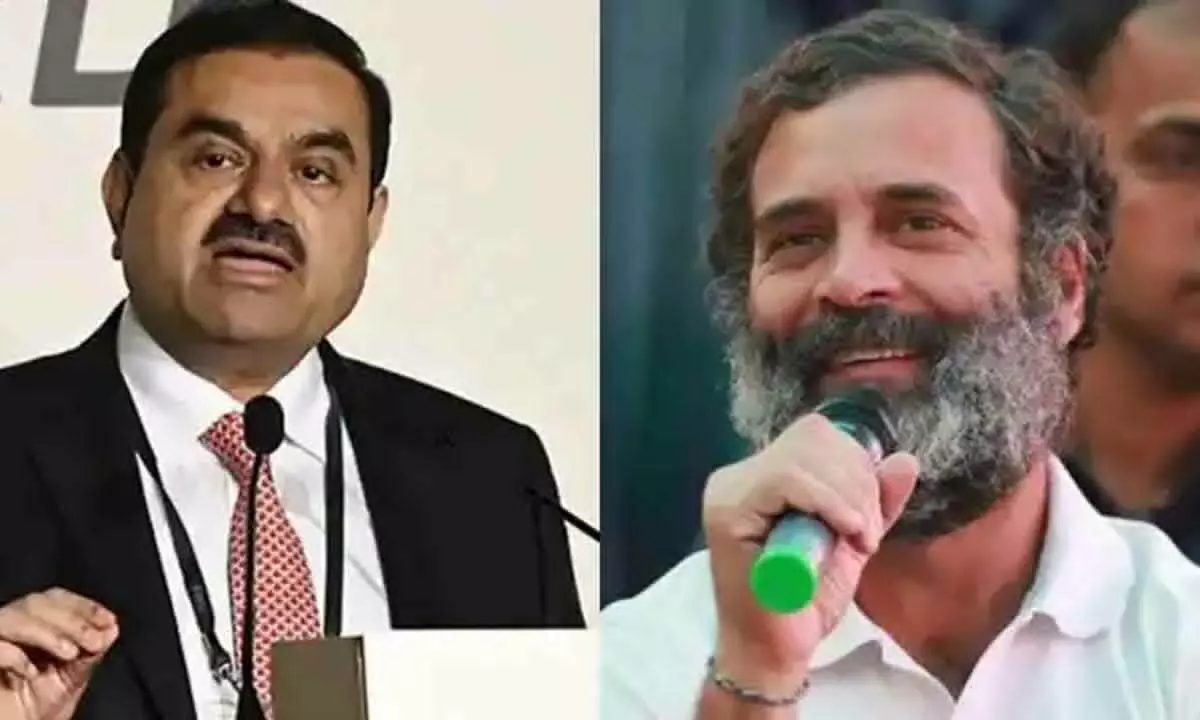Demanding JPC on Adani Group is a bad precedent; no gains for Oppn
Passing Finance Bill 2023 and Budget 2023 without any discussion not a good sign. It was last full-fledged Budget by the Modi government before the country heads to General Elections next summer
image for illustrative purpose

The Lok Sabha passed the crucial Finance Bill 2023 without any discussion on March 24. The Rs 45-lakh-crore Union Budget for 2023-24 also underwent a similar process a day before, both of which are a rarity in the Lower House.
A thorough and heated debate on Budget proposals and Finance Bill are always good. Such debates obviously give a chance to the Opposition parties to question the central government on short-comings in the proposals and also corner it on public issues.
But the Opposition's focus was elsewhere this time, especially after US-based Hindenburg Research published a damaging report on billionaire GautamAdani's companies. The short seller, which claimed to have conducted a year-long investigation into Adani Group, accused the diversified conglomerate and its promoters of stock manipulation and brazen fraud. Post this report, shares of Adani Group's listed companies crashed. The diversified group lost more than Rs 12 lakh crore in market capitalisation. Though retail investors also took a hard hit, it was the promoters who lost heavily in the crash as they still hold commanding stakes in the companies. However, Adani Group regained some of the lost ground in the stock markets in recent times.
But the issue attained political colour after Congress, the main opposition party at the national level and its leader Rahul Gandhi, started making a vociferous demand for a probe into the group and its business activities in the wake of allegations levelled by Hindenburg Research.
They have been trying to corner Prime Minister Narendra Modi over his alleged long-prevailing closeness to Adani. Rahul Gandhi displaying a hitherto unknown aggressiveness sharpened his weapons while demanding a Joint Parliamentary Committee (JPC) on the issue. Cashing in on, the oppositionbenches also rallied behind the Congress party. The Opposition stuck to its JPC demand and stalled the Parliament even after the Supreme Court appointed an independent panel to look into the issue and market regulator Sebi launched its own probe.
As a firefighting tactic, the BJP tried to turn the tables with a counterattack while demanding an apology from Rahul Gandhi for his remarks on Indian democracy in the UK. The result was that the two houses of Parliament did not take up any business during the Budget session. But the Lok Sabha gave its nod for the Budget and Finance Bill without any discussion amid protests by the Opposition. Incidentally, it was last full-fledged Budget by the Modi government before the country heads to General Elections next summer.
With the ruling BJP refusing to yield to the JPC demand and Gandhi getting disqualified from Lok Sabha after his conviction in a defamation case, Congress is most likely to make the Adani crisis as the key issue in the upcoming elections right up to the 2024 General Elections.
In the run up to the 2019 elections, Gandhi levelled allegations of corruption in the defence deal signed by Indiawith the French for acquiringDassaultRafale fighter aircraft. He also alleged that the Modi government had unduly favoured Anil Ambani group in the defence deal. Based on these allegations, Gandhi, the then president of the Congress party, targeted Modi with his ‘ChowkidarChorHai’ campaign. Despite that, Modi returned to power and that with a bigger majority. However, industrialist Anil Ambani got caught in the political crossfire and paid a heavy price as his group landed in a financial mess.
Given this backdrop, will the Adani issue bring any political dividends to the Congress in the upcoming elections? It is very unlikely even if Congress deploys a different strategy this time around.
Frankly speaking, Adani Group is a private entity. And there are no concrete allegations of the Modi government doing any undue favourslike awarding government contracts or in any other way.
Of course, State Bank of India, a public sector bank, has significant exposure to the companies of Adani group. So are many other public sector banks. Insurance behemoth LIC also invested in Adani companies. But the fact of the matter is that these state-owned entities lent to and invested in scores of private companies. How then can Adani Group be singled out?
Till now, the Parliament has appointed nine JPCs, starting with the 1987 one on Bofors scandal, in which Rahul’s father Rajiv Gandhi was accused of receiving kickbacks. None of them was appointed to probe a private entity. In this background, demanding JPC probe on a private entity will obviously set a bad precedent.
In the circumstances, the Congress and other opposition parties would be better-off, in terms of political dividends, if they focus on serious public issues instead of targeting a private business house. There are so many issues that people are facing these days-price rise, inflation, rising taxes and unemployment, et al.
In the latest Finance Bill, the central government has done away with tax benefits on investments in debt mutual funds. It brought in an amendment to the Bill to make the change. Thanks to SIPs and other avenues, MFs have become attractive investment options now. This move will hit millions of investors. Incidentally, the government could make the change without any opposition. So is the case with the other amendments to the Finance Bill. The Opposition has done nothing to highlight them.
It is high time the Opposition realises that the Adani issue, even if it is pursued vigorously, is unlikely to cause any damage to Modi's personal image.
If the Opposition is serious about unseating BJP from power at the Centre, it should convince Indian people that they can provide a better alternative. There is no other way. Otherwise, BJP will romp home in the 2024 General Elections hands down!

